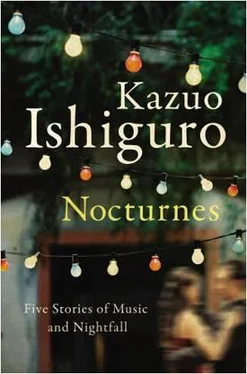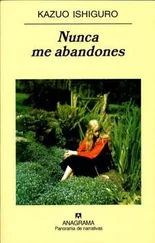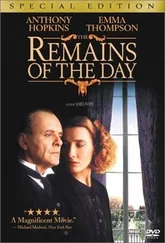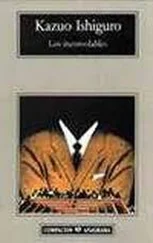“It’s just what we wanted,” said Sonja. “Thank you.”
I pretended again to become absorbed in my chords. Then I said as casually as I could: “Come to think of it, there’s this other hotel I know. I think it’s better than Malvern Lodge. I think you should change.”
“Oh, but we’re quite settled now,” said Tilo. “We have unpacked our things, and besides, it’s just what we need.”
“Yeah, but… Well, the thing is, earlier on, when you asked me about a hotel, I didn’t know you were musicians. I thought you were bankers or something.”
They both burst out laughing, like I’d made a fantastic joke. Then Tilo said:
“No, no, we’re not bankers. Though there have been many times we wished we were!”
“What I’m saying,” I said, “is there are other hotels much more geared, you know, to artistic types. It’s hard when strangers ask you to recommend a hotel, before you know what sort of people they are.”
“It’s kind of you to worry,” said Tilo. “But please, don’t do so any longer. What we have is perfect. Besides, people are not so different. Bankers, musicians, we all in the end want the same things from life.”
“You know, I’m not sure that is so true,” Sonja said. “Our young friend here, you see he doesn’t look for a job in a bank. His dreams are different.”
“Perhaps you are right, Sonja. All the same, the present hotel is fine for us.”
I leant over the strings and practised another little phrase to myself, and for a few seconds nobody spoke. Then I asked: “So what sort of music do you guys play?”
Tilo shrugged. “Sonja and I play a number of instruments between us. We both play keyboards. I am fond of the clarinet. Sonja is a very fine violinist, and also a splendid singer. I suppose what we like to do best is to perform our traditional Swiss folk music, but in a contemporary manner. Sometimes even what you might call a radical manner. We take inspiration from great composers who took a similar path. Janáček, for instance. Your own Vaughan Williams.”
“But that kind of music,” Sonja said, “we don’t play so much now.”
They exchanged glances with what I thought was just a hint of tension. Then Tilo’s usual smile was back on his face.
“Yes, as Sonja points out, in this real world, much of the time, we must play what our audience is most likely to appreciate. So we perform many hits. Beatles, the Carpenters. Some more recent songs. This is perfectly satisfying.”
“What about ABBA?” I asked on an impulse, then immediately regretted it. But Tilo didn’t seem to sense any mockery.
“Yes, indeed, we do some ABBA. ‘Dancing Queen.’ That one always goes down well. In fact, it is on ‘Dancing Queen’ I actually do a little singing myself, a little harmony part. Sonja will tell you I have the most terrible voice. So we must make sure to perform this song only when our customers are right in the middle of their meal, when there is for them no chance of escape!”
He did his big laugh, and Sonja laughed too, though not so loudly. A power-cyclist, kitted out in what looked like a black wetsuit, went speeding by us, and for the next few moments, we all watched his frantic, receding shape.
“I went to Switzerland once,” I said eventually. “A couple of summers ago. Interlaken. I stayed at the youth hostel there.”
“Ah yes, Interlaken. A beautiful place. Some Swiss people scoff at it. They say it is just for the tourists. But Sonja and I always love to perform there. In fact, to play in Interlaken on a summer evening, to happy people from all over the world, it is something very wonderful. I hope you enjoyed your visit there.”
“Yeah, it was great.”
“There is a restaurant in Interlaken where we play a few nights every summer. For our performance, we position ourselves under the restaurant’s canopy, so we are facing the dining tables, which of course are outdoors on such an evening. And as we perform, we are able to see all the tourists, eating and talking together under the stars. And behind the tourists, we see the big field, where during the day the paragliders are landing, but which at night is lit up by the lamps along the Höheweg. And if your eye may travel further, there are the Alps overlooking the field. The outlines of the Eiger, the Mönch, the Jungfrau. And the air is pleasantly warm and filled with the music we are making. I always feel when we are there, this is a privilege. I think, yes, it is good to be doing this.”
“That restaurant,” Sonja said. “Last year, the manager made us wear full costumes while we performed, even though it was so hot. It was very uncomfortable, and we said, what difference does it make, why must we have our bulky waistcoats and scarves and hats? In just our blouses, we look neat and still very Swiss. But the restaurant manager tells us, we put on the full costumes or we don’t play. Our choice, he says, and walks away, just like that.”
“But Sonja, that is the same in any job. There is always a uniform, something the employer insists you must wear. It is the same for bankers! And in our case, at least it is something we believe in. Swiss culture. Swiss tradition.”
Once again something vaguely awkward hovered between them, but it was just for a second or two, and then they both smiled as they fixed their gazes back on my guitar. I thought I should say something, so I said:
“I think I’d enjoy that. Being able to play in different countries. It must keep you sharp, really aware of your audiences.”
“Yes,” Tilo said, “it is good that we perform to all kinds of people. And not only in Europe. All in all, we have got to know so many cities so well.”
“Düsseldorf, for instance,” said Sonja. There was something different about her voice now-something harder-and I could see again the person I’d encountered back at the cafe. Tilo, though, didn’t seem to notice anything and said to me, in a carefree sort of way:
“Düsseldorf is where our son is now living. He is your age. Perhaps a little older.”
“Earlier this year,” Sonja said, “we went to Düsseldorf. We have an engagement to play there. Not the usual thing, this is a chance to play our real music. So we call him, our son, our only child, we call to say we are coming to his city. He does not answer his phone, so we leave a message. We leave many messages. No reply. We arrive in Düsseldorf, we leave more messages. We say, here we are, we are in your city. Still nothing. Tilo says don’t worry, perhaps he will come on the night, to our concert. But he does not come. We play, then we go to another city, to our next engagement.”
Tilo made a chuckling noise. “I think perhaps Peter heard enough of our music while he was growing up! The poor boy, you see, he had to listen to us rehearsing, day after day.”
“I suppose it can be a bit tricky,” I said. “Having children and being musicians.”
“We only had the one child,” Tilo said, “so it was not so bad. Of course we were fortunate. When we had to travel, and we couldn’t take him with us, his grandparents were always delighted to help. And when Peter was older, we were able to send him to a good boarding school. Again, his grandparents came to the rescue. We could not afford such school fees otherwise. So we were very fortunate.”
“Yes, we were fortunate,” Sonja said. “Except Peter hated his school.”
The earlier good atmosphere was definitely slipping away. In an effort to cheer things up, I said quickly: “Well, anyway, it looks like you both really enjoy your work.”
“Oh yes, we enjoy our work,” said Tilo. “It’s everything to us. Even so, we very much appreciate a vacation. Do you know, this is our first proper vacation in three years.”
This made me feel really bad all over again, and I thought about having another go at persuading them to change hotels, but I could see how ridiculous this would look. I just had to hope Hag Fraser pulled her finger out. Instead, I said:
Читать дальше












